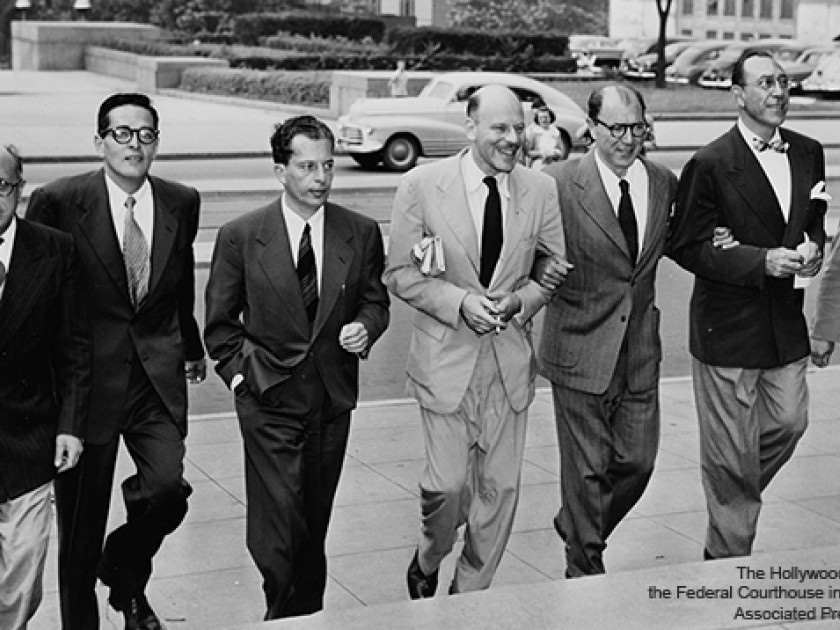
Earlier this week, Glenn Frankel introduced MGM producer Dore Schary among the overwhelmingly Jewish history of the Hollywood Blacklist, the subject of his new book High Noon: The Hollywood Blacklist and the Making of an American Classic. Glenn is guest blogging for the Jewish Book Council all week as part of the Visiting Scribe series here on The ProsenPeople.
As I discovered in researching my book on the Hollywood blacklist and the making of High Noon, the blacklist tore Hollywood apart: it ruined careers, destroyed trust, and set families and friends against each other. Those who were identified as Communists, fellow travelers, or even as liberal activists had few choices. If called to appear before the House Committee on Un-American Activities (HUAC), they could either invoke the Fifth Amendment against self-incrimination — a strategy that ensured they would be blacklisted from further employment — or denounce their left-wing views and betray their fellow activists by naming names. Those willing to do so needed a lawyer to help them navigate the process. And none was better at it than Martin Gang.
A pillar of the Los Angeles Jewish community, Gang wound up representing more informers than any other Hollywood lawyer — by his own estimate, some twenty movie people and thirty more in other professions. His justification was simple: he was helping worthy but misguided people stay out of prison and keep their jobs. He claimed that his clients never initiated naming anyone, but simply confirmed names that the Committee already had obtained. His own duty, he solemnly declared, was to his clients.
Gang’s parents were Eastern European Jews who came to the United States in the 1890s, and he himself was born in Passaic, New Jersey, in 1901. After graduating from Harvard, he spent part of the 1920s studying economics in Weimar Germany. He watched the systematic destruction of the German middle class by inflation and open street warfare between Fascists and Communists. It made him suspicious of extremists of both political stripes and determined to appease the powers that be. When he returned to America, he earned a law degree from the University of California at Berkeley and made his way to Hollywood, where he eventually launched his own entertainment law firm. His list of celebrity clients included Bob Hope, George Burns, Frank Sinatra, Rita Hayworth, Burt Lancaster, Lucille Ball, and Myrna Loy. He put up with their tantrums and their quirks. “Movie people are like everybody else, only more so,” he liked to say.
His first big blacklist case involved Sterling Hayden, a rising young star who had joined the American Communist Party for a brief spell after serving in World War II. Hayden was called to testify before HUAC in April 1951. Under Gang’s careful guidance, Hayden gave a full-throated condemnation of the party, praised the committee for its courageous work and named as Communists five people, including his former mistress. Years later, he expressed deep regret for his testimony. “I (felt) like a bear led on a chain by the lawyer,” he wrote.
After his success with Hayden, Gang began to serve as a bridge between the gentiles of HUAC and the Jews of Hollywood. He didn’t believe the Committee members themselves were antisemitic, but he knew there were plenty of irresponsible people compiling lists and making allegations about Jews. “I didn’t like the committee but I worked with it, because I had a responsibility to my clients and their lives,” he recalled.
Members of the Communist Party and those who sympathized often expressed contempt for Martin Gang. Rumor had it that Gang and his law firm made large fees off their political clients. (In fact, Gang plausibly claimed that his partners were not happy with his taking on these controversial cases, saying they made more enemies than friends and cost the firm between $50,000 and $100,000 in lost legal fees).
Gang was a man of great charm and bluster, but he sometimes lost patience with clients who refused to see the light. When screenwriter Carl Foreman resisted naming names, Gang warned that the government was preparing to reopen the concentration camp at Tule Lake, California, that had been built to detain Japanese Americans during World War II. Only this time, Gang warned, the detainees would be Leftists like Foreman. “He had set out to frighten me, and he did,” Foreman recalled.
(Still, Foreman refused to cooperate and hired a different lawyer.)
As usual in Jewish history, individual Jews responded in various and conflicting ways to the repression they faced. One response was Martin Gang’s: give the despot what he demands. Another was Carl Foreman’s, resisting for the sake of principle even at the cost of one’s own livelihood. What I love about studying history is that it always poses the same uncomfortable question to all of us: If faced with a similar terrible dilemma, what would we have done?
Glenn Frankel worked for many years for The Washington Post, serving as bureau chief in London, Southern Africa, and Jerusalem, where he won the 1989 Pulitzer Prize for International Reporting. He has taught journalism at Stanford University and the University of Texas at Austin, where he directed the School of Journalism. He is the author of five books, has won a National Jewish Book Award, and was a finalist for The Los Angeles Times Book Prize. He has been a Motion Picture Academy Film Scholar and a research fellow at the Leon Levy Center for Biography at the City University of New York. Rivonia’s Children, first published in 1999 and republished in 2024 by Blue Ear Books, was a finalist for the Alan Paton Prize, South Africa’s highest honor for nonfiction.